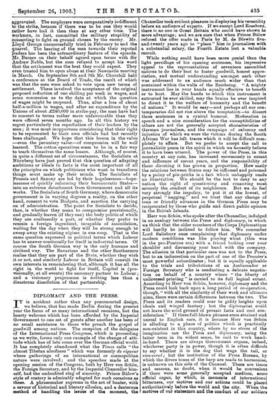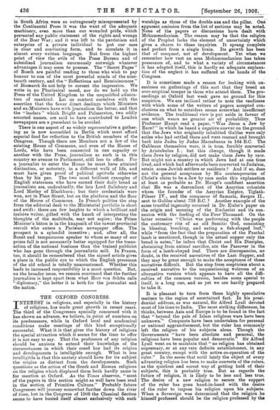DIPLOMACY AND THE PRESS.
TT is accident rather than any preconcerted design, we believe, that has made Berlin during the present year the focus of so many international reunions, but the hearty welcome which has been afforded by, the Imperial Government to one set of guests after another has been of no small assistance to those who preach the gospel of goodwill among nations. The reception of the delegates of the International Press Congress, which is proceeding 83 we write, forms only one example of the change of atti- tude which has of late come over the German official world. It has completely abandoned what the Times calls "the almost Tibetan aloofness " which was formerly de rigueur where gatherings of an international or cosmopolitan nature were involved ; and the speeches made at the opening session of the Congress, both by Herr von Schiin, the Foreign Secretary, and by the Imperial Chancellor him- self, had the undoubted ring of sincerity. Prince Billow's style of oratory is admirably adapted for such occasions as these. A phrasemaker supreme in the art of banter, with a savour of historical and literary allusion, and a dexterous method of handling the issues of the moment, the Chancellor took evident pleasure in displaying his versatility before an audience of experts. If we except Lord Eosebery, there is no one rn Great Britain who could have shown to more advantage; and we are sure that when Prince Billow refused the offer made in Paris by M. de Blowits five. sad-twenty years ago to "place" him in journalism with substantial salary, the Fourth Estate lost a valuable recruit.
While nothing could have been more genial than the light persiflage of his opening sentences, his impressive appeal to the representatives of seventeen assembled nations to do their best to foster goodwill, honest appre- ciation, and mutual understanding amongst each other was addressed to an audience much wider than that contained within the walls of the Reichstag. "A mighty instrument lies in your hands equally effective to benefits or to hurt. May the hands to which this instrument is entrusted be ever skilled, may the brains be ever inspired to direct it to the welfare of humanity and the benefit of nations." It would be eesy—and perhaps all our con. temporaries did not rise above the temptation—to dissect these sentences in a cynical humour. Moderation in speech and a nice consideration for the susceptibilities of others are not the generally accepted charaateristics of German journalism, and the campaign of calumny and injustice of which we were the victims during the South Afrieen War has left traceswhich it will be difficult coin. pletely to efface. But we prefer to accept the call to journalistic peace in the spirit in which we honestly believe it to have been uttered. The power of the Press, in this country at any rate, has increased enormously in extent and influence of recent years, and the responsibility of those directing it has grown in proportion. How easily the relations between States way be inflamed and poisoned by a policy of pin-pricks is a fact which unhappily needs no illustration. We should be the last to deny to any nation the right of questioning and censuring most severely the conduct of its neighbours. But we do feel very strongly the impolicy, to put it at the lowest, of perpetual " nagging," and we trust that any change of tone or friendly advances in the German Press may be reciprocated by those who guide and direct public opinion in the British Islands.
Herr von Schorr, who spoke after the Chancellor, indulged in an analogy between the Press and diplomacy, in which we think that the older members of the Corps Diplomatique will hardly be inclined to follow him. We remember Lord Salisbury once complaining that diplomacy under modern conditions was like playing whist (this was in the pre-Pontine era) with a friend looking over your shoulder and discussing your hand with the company. The allusion in that particular case was not to the Press, but to an indiscretion on the part of one of the Premier's most powerful subordinates ; but it is equally applicable to the trials and tribulations of an Ambassador or Foreign Secretary who is concluding a, delicate negotia- tion on behalf of a country where " the liberty of unlicensed printing " is carried to its full logical extent.
According to Herr von Schon, however, diplomacy and the Press could look back upon a long period of co-operation, though," with all the similarity of their work and ultimate aims, there were certain differences between the two. The Press and its readers could soar to giddy heights upon ideals and winged fantasy ; but the diplpmatist could not leave the solid ground of prosaic facts and cool con- sideration." If these full-blown phrases seem strained and unreal to English ears, it is because Herr von Scharr is alluding to a phase of politics which is practically non-existent in this country, where by no stress of the imagination can the Frew; and diplomacy, using the latter term in its widest sense, be said to work hand- in-hand. There are always Government organs, indeed, whichever party is in power, though it is often difficult to say whether it is the dog that wags the tail, or vice-versci ; but the institution of the Press Bureau, by which the divers tones of the harp are made to harmonise, is unknown on this side of the Channel. There are time and seasons, no doubt, when it would be convenient if there were some generally accepted medium, some of vial organ, by which, in moments of international bitterness, our motives and our actions could be placed authoritatively before the world and the city. When the motives of our statesmen end the conduct of our soldier, in South Africa were so outrageously misrepresented by the Continental Press it was the want of the adequate machinery, even more than our wounded pride, which prevented any public statement of the rights and wrongs of the Boer War ; and it was left to the patriotism and enterprise of a private individual to put our case in clear and convincing form, and to circulate it in almost every written language. But from the highest point of view the evils of the Press Bureau and of subsidised journalism enormously outweigh whatever advantages it may seem to possess. The " Secret Pages " of Busch are painful reading to those who wish to pay honour to one of the most powerful minds of the nine- teenth century, and the " Reflections and Reminiscences " of Bismarck do not help to correct the impression. We write in no Pharisaical mood, nor do we hold up the Press of the United Kingdom to the unqualified admira- tion of mankind. Let us content ourselves with the assertion that the fewer direct dealings which Ministers and ex-Ministers have with journalism the better, and that the "leaders " which Bright and Palmerston, two oddly assorted names, are said to have contributed to London newspapers are a precedent to be avoided.
There is one aspect of so widely representative a gather- ing as is now assembled in Berlin which must afford especial food for reflection to the British members of the Congress. Though there are Members not a few of the existing House of Commons, and even of the House of Lords, who have been connected in one capacity or another with the Press, journalism as such is in this country no avenue to Parliament, still less to office. For a journalist to enter the House he must have attained distinction, or notoriety, in a different walk of life, and must have given proof of political aptitude otherwise than by his pen. The two most brilliant examples of English statesmen who have earned their daily bread as journalists are, undoubtedly, the late Lord Salisbury and Lord Morley of Blackburn ; but their credentials were won, not in Fleet Street, but on the platform and the floor of the House of Commons. In French politics the step from the editorial desk to the Ministerial portfolio is short and swift: there are few heights to which a brilliant and incisive writer, gifted with the knack of interpreting the thoughts of the multitude, may not aspire; the Prime Minister's baton is in the knapsack of the rawest provincial recruit who enters a Parisian newspaper office. The prospect is a splendid incentive ; and, after all, the fluent and tempestuous speaker to whom so many of our prizes fall is not necessarily better equipped for the trans- action of the national business than the trained publicist who has gone through the journalistic mill. In France, too, it should. be remembered that the signed article gives a place in the public eye to which the English pressman of the old school is totally unaccustomed. Whether this leads to increased responsibility is a moot question. But, on the broader issue, we remain convinced that the further journalism is kept apart from what Herr von Schou calls "diplomacy," the better it is both for the journalist and the, nation.











































 Previous page
Previous page